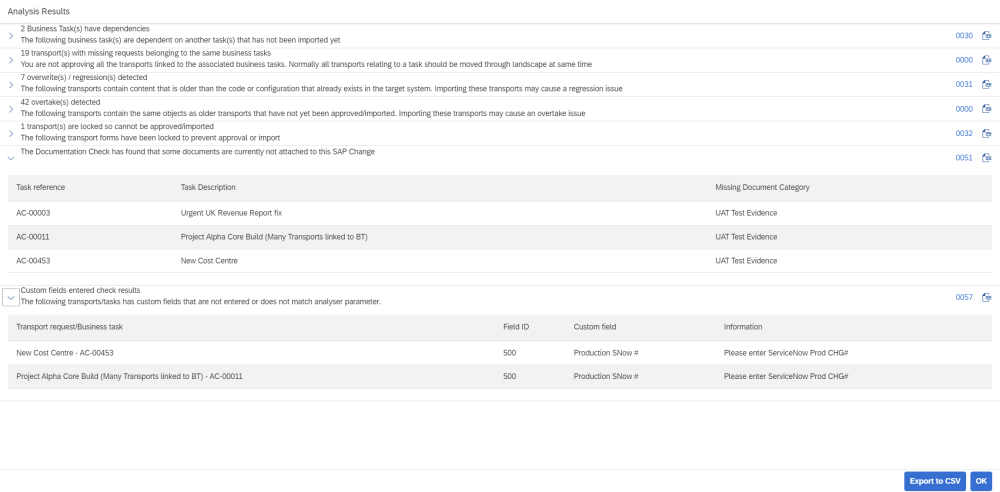ActiveControl includes a suite of 70+ automated ShiftLeft analysis checks that can be configured to run automatically as part of an Inbox, Outbox or Test Queue approval – or as part of an Import Queue deployment. These checks can also be run manually if required.
The ActiveControl Shiftleft checks are aimed at providing early warning of potential issues in the SAP changes being delivered, and improving the quality of the transports and changes leaving your development system – and subsequently as they are deployed further through the SAP landscape. By making use of these automated checks, ActiveControl customers can expect to see a significant reduction in the amount of test defects, development rework and ultimately RC8 import errors typically experienced when deploying SAP change to test and production systems.
Not all ActiveControl customers need to use all of the ShiftLeft analysers. Some of the more commonly implemented ShiftLeft analyser checks include the following:
| ID | Analyser Name | Summary of Analyser |
|---|---|---|
| 0030 | Check Dependencies | Identifies if there is any dependency on another transport that has yet to be imported. It can also identify if a partial change is being deployed (eg if there are two transports against a particular Business Task, but the user is only trying to approve one of them. |
| 0031 | Overtake and Regression Checks | Identifies if transports are being approved or imported out of sequence. An overtake is when you try to move a newer version of an object ahead of an older version. A Regression is when you try to move an older version ahead of a newer version, therefore causing newer changes to be overwritten. |
| 0034 | Check Transport Release | Identifies if the transport is released (as otherwise it cannot be imported). |
| 0001 | Risk Guard | Identifies if the transport contains objects that have been deemed risky/critical within your organisation. |
| Various | Dev Enforcer | Identifies if the transport contains changes that fall outside of standard SAP coding, security and performance check expectations. |
| 0009 | Check Releasability | Identifies if there are problems in an modifiable transport that will prevent it from being released. Eg if a program change is still inactive. |
| 0005 | Conflict Analysis | Identifies if a transport being deployed to a Development system conflicts with changes done to the same object in that system. |
| 0028 | Check Own Changes | Identifies (and potentially prevents) a user from approving, testing or importing their own transport at a particular point in the process. |
| 0051 | Check Documentation | Identifies if any documentation has not been added at a particular point in the process. Eg if a Developer tries to sign off their Unit Testing without first adding some unit test evidence. |
| 0055 | Changes to Same Objects in Path | Identifies if the objects within a Transport are also contained within other Transports that are forward/backward in the same Transport Path. |
| 0057 | Check Custom Field entered | Identifies if a custom field on a Business Task or Transport Form has not been populated. |
| 0060 | Deep Impact Analysis (New) | Identifies if a lower-level dependent object is not yet deployed to the target system into which you are about to import an object. |
| 0063 | Approver SOD Check | Identifies if a user is attempting to do two specific approvals in the same workflow that are supposed to be done by different users. |
| 0071 | SAP Level Checks | Identifies some common SAP-level issues such as if a Transport has been deleted at SAP level, or if the Transport contains no objects. |
A full list of the ShiftLeft analysis checks is available from Basis Technologies – or from your internal Customer ActiveControl Administrator(s) – on request.

Figure: Example of some ShiftLeft: Analysis Check results within the ActiveControl Web Platform.
The unique NNNN identifier of the ActiveControl analyser is shown in the Analysis Results screen. This is to make it easier for Customer AC Administrators and the Basis Technologies Support Team to identify which Analyser the results relate to. It is also possible to export individual (or all) Analysis Results to CSV file via the ‘Export to CSV’ option on the Analysis Results screen. This can be useful when the number of analyser results are large, or when you need to share with other stakeholders.



Post your comment on this topic.